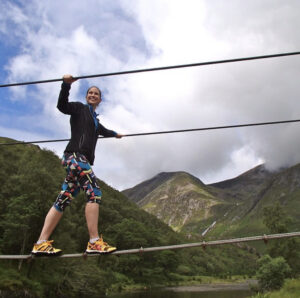It is this time of the month to honor the efforts of a Physiopedia employee. This month's recipient is someone who works tirelessly behind the scenes to measure the efforts of physiopedia through numbers while adding scientific accuracy to our activities and projects. Nicole is our Knowledge Translation Manager and often represents physiopedia at international events such as the Online World Physiotherapy Congress 2021.
She also makes significant contributions to our projects such as the annual Massive Open Online Courses (MOOCs) and most recently the ReLAB-HS project. Special congratulations to Nicole, who was awarded the following congress award: World Physiotherapy Outstanding Platform Presentation Award: North America Caribbean region for her lecture "Participant results of a Massive Open Online Course (MOOC) developed as" a reaction, to educate physiotherapists about the coronavirus disease 2019 ". Great job Nicole, you deserve to be our top contributor for the month of June! Thank you very much for everything you do and for representing physiopedia so professionally.
Your name : Nicole Beamish
Active time at Physiopedia: I started my voluntary work at Physiopedia in the summer of 2018.
Current position at Physiopedia: I am currently the Knowledge Translation Manager for Physiopedia.
Where did you go to university / college? I completed my physical therapy training (MScPT) at Queen’s University (Kingston, ON, Canada). I also have my Ph.D. in Rehabilitation Science at Queen & # 39; s University.
Where do you work? I am Adjunct Assistant Professor at the School of Rehabilitation Therapy at Queen’s University, Canada.
Describe your role: At Physiopedia I am currently the Knowledge Translation Manager. In this role, I have the opportunity to collaborate with researchers and physiotherapists from around the world on various research and knowledge transfer activities. Some of the highlights of this year were working with the Physiopedia team on our WCPT presentations and various projects related to the ReLAB-HS project.
At Queen’s University, my main job is currently teaching in the physiotherapy department. For the past year, I have taught sophomore and sophomore students in many different fields, including functional anatomy, basic clinical skills, cardiorespiratory function, spinal disorders, and pediatrics.
What is the most rewarding part of being a physical therapist? Helping clients and patients achieve their goals.
What are some of the more difficult aspects of being a physical therapist? Linking evidence to practice. Bridging the gap between research and clinical practice is a challenge for all clinicians and students. But it is the art and science of our profession that drive it to continue to develop and change.
What are your professional passions? I am passionate about research. My research interests are in women's health, particularly the musculoskeletal and cardiovascular changes that occur during pregnancy and the puerperium. I am also passionate about advancing the field of physiotherapy and global health through the dissemination of research knowledge in the clinical setting.
What are some of your personal passions? I enjoy spending time with my family, traveling, and being outside.

What would you advise a newly qualified physiotherapist to do? Never stop learning!
Where do you see yourself in 5 years? One of the great things about the physical therapy profession is that you never know where it will take you. In 5 years I hope to teach, research, learn and smile!
What's the best part about being a volunteer in Physiotherapy? Meet and collaborate with physiotherapy colleagues from around the world. Working on abstracts and presentations with physiotherapists in different countries can be so rewarding.
How has volunteering at Physiopedia contributed to your professional development / career? I really enjoyed the various opportunities and connections that Physiopedia created for me. The opportunity to work with physiotherapists from all over the world on various research projects over the past 3 years has had a very positive effect on my professional development.
What are your hopes and aspirations for physiopedia? That physiopedia will continue to grow and improve global health through universal access to physiotherapeutic knowledge.
 What is your favorite course at Physioplus? Good question! Physioplus is constantly adding new courses and content, which makes it an incredible resource. I enjoy the annual MOOCs that Physiopedia creates. The most recent MOOC, the Coronavirus Disease Program, was unique in that it was free for anyone, anywhere for almost a year (March 2020 – December 2020). The most impressive thing about this course is that over a million learners from 214 countries attended and studied this course!
What is your favorite course at Physioplus? Good question! Physioplus is constantly adding new courses and content, which makes it an incredible resource. I enjoy the annual MOOCs that Physiopedia creates. The most recent MOOC, the Coronavirus Disease Program, was unique in that it was free for anyone, anywhere for almost a year (March 2020 – December 2020). The most impressive thing about this course is that over a million learners from 214 countries attended and studied this course!
Would you like to share something else? The universal access to physiotherapeutic knowledge is so important for our profession. Physiopedia offers researchers interested in physiotherapy, rehabilitation and global health a unique platform to openly share their knowledge and research results. If you are a researcher and are looking for ways to reach physiotherapists worldwide, please do not hesitate to contact us.